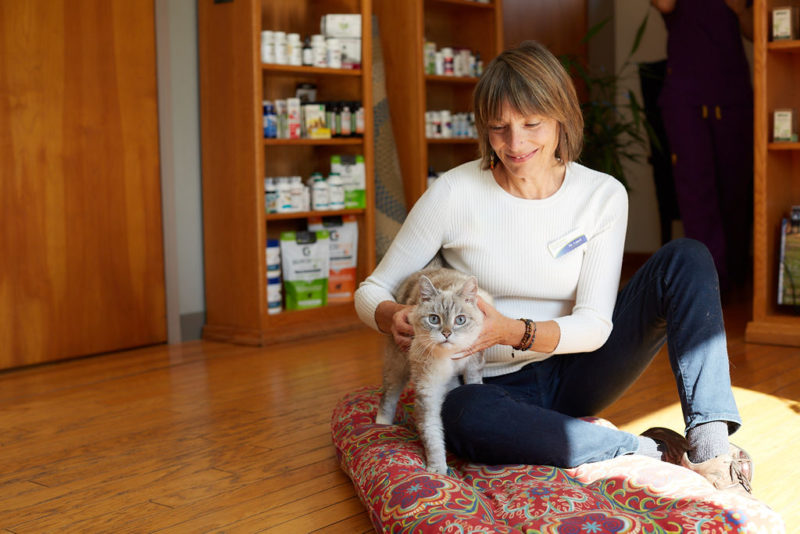Here is your cat’s life in a nutshell: Sleep, patrol, play, hunt, groom, sleep. That may be simplifying things a bit, but my point is, that if only one of these items is taken out of your cat’s routine, it will most likely cause your cat anxiety or stress.
For example, if you have an indoor cat that sleeps and grooms but doesn’t hunt, then you are probably looking at a kitty that will be stressed and anxious. I personally feel the expression ‘pissed off’ could come from our kitty friends’ tendency to let us know of their stress or frustration by simply taking a leak outside of their litter boxes, in plain site and in inconvenient areas.
Possible Causes of Cat Anxiety
- Moving to a new home or the addition of a new family member such as a new partner, child or animal
- Boredom, or a lack of exercise or play
- Fear caused by loud noises, certain people, other cats or dogs, new household objects or a busy household
- Inadequate nutrition
- Health problems or pain
- Inadequate living space
- Changes to daily routine
- Being an indoor cat. For some cats, this is just not an option.
- The loss of an animal friend
- Unclean litter box or not enough litter box privacy
- Lack of a safe place to sleep
- An outright traumatic experience
- Separation from her owner, even for a short time.
Every cat shows signs of anxiety in their own way. If you are noticing a change in your feline’s behavior, take time to evaluate the situation. Put yourself in your cat’s paws, and see if you can sleuth out the reason. Of course, you can always connect with your purr bucket using this technique. Below are some cat behaviors which may be warning signs of kitty cat angst.
Warning Signs of Cat Anxiety
- Hiding more than normal
- Changes in appetite or weight/digestive distress like vomiting or diarrhea
- Excessive vocalizing
- Urinating or defecating in inappropriate places
- Compulsive behaviors such as pacing or excessive grooming, sometimes to the point where she is virtually bald over part of her body
- Aggression or extreme vigilance/defensiveness
- Health changes
- Lethargy or despondency, reduction in play or physical activity
- Greeting owners exuberantly when they return home and following them from room to room, showing clinginess or increased dependence on people
- New destructive behaviors such as furniture scratching
- Trembling or restlessness
- If she is an indoor/outdoor cat, refusing to go outside or staying outside for extended periods of time, depending on where the stressors reside.
Ways to Help Eliminate your Kitty’s Anxiety

- Enhance her environment so she has plenty of stimulation
- Grow catnip and cat grass
- Exercise your purr-bucket through play, especially with toys and games that turn her mental wheels
- Spend time with her and lavish her with LOVE
- Feed her correct amounts of energetic and nutritious food
- Note the height at which your feline prefers to hang and create comfortable perches for her to snooze or to observe her lair.
- Feed cats at separate bowls and have several water bowls throughout the house and outside, if she is an indoor/outdoor kitty.
- Always have one more litter box than the number of cats in the house.
- Never punish a cat that has misbehaved. If she is experiencing anxiety, she is acting out of fear and not being ‘bad’. Punishment can escalate the situation. Ignore this behavior and reward calm behavior with high value (yummy) treats and a kind, non-invasive demeanor
- If the anxiety is a result of real or perceived feline aggression in a multi-kitty household, the feline facial pheromone, Feliway, sprayed at nose level on inanimate objects and walls or generally diffused can help your cats feel more safe and secure. Sunvet Animal Wellness Clinic carries Feliway as a spray or in diffuser form.
- Sunvet Animal Wellness Clinic has found that feline anxiety responds exceptionally to Pranic Healing. This is a form of energetic healing that can be done at the office or remotely. We’ve discussed this amazing modality here.
If you have noticed your sweet kitty is out of sorts, behaving differently or exhibiting any of the above behaviors, take the time to sort through any reasons that this may be. Don’t hesitate to take her to your local holistic veterinarian to rule out any physical troubles. If you have decided stress and anxiety might be the origin of her behavior or demeanor, I hope this article might help give you some ideas.
We all want thriving and happy people and kitties!


